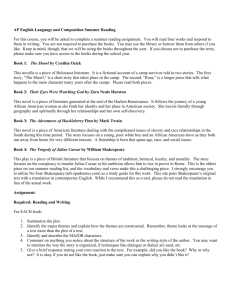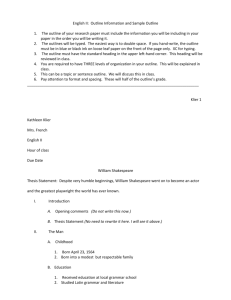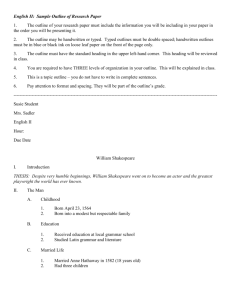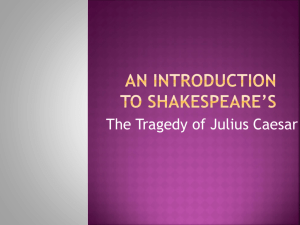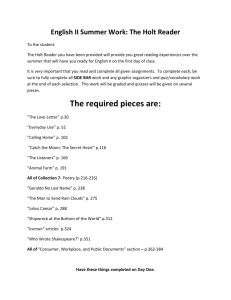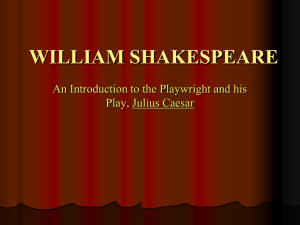Shakespeare PPT william_shakespeare_author
advertisement
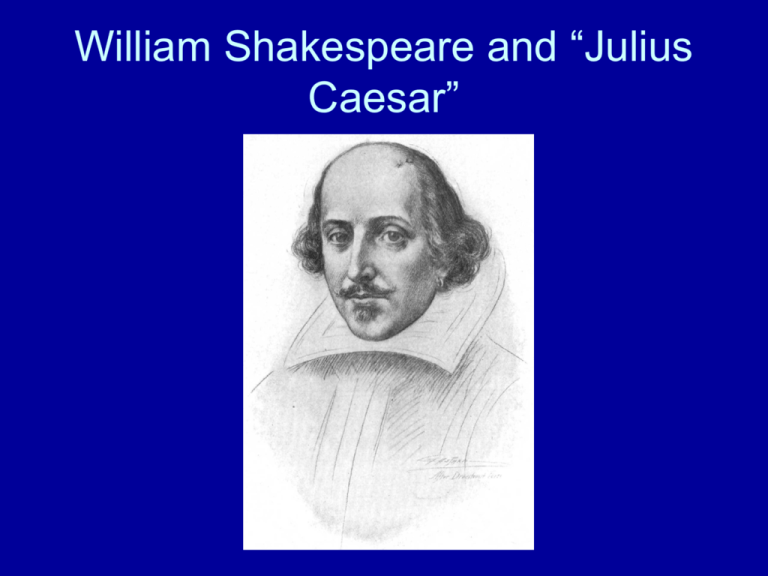
William Shakespeare and “Julius Caesar” Shakespeare Early Life • Born in Stratfordupon-Avon 1564. • Exact date a bit of a mystery, but accepted as April 23rd. • Father was a glove maker. • Studied Greek, Latin, French in school. Shakespeare Early Adulthood • Believed to have left school at age 14. • Married Anne Hathaway in 1582 when he was 18. • Birth of twin sons in 1585. Early Career • Became involved in theater and published first plays in 1592, “Two Men of Verona.” • A plague closed the theater in 1593, so went on to write famous sonnets. From Playwright to Superstar • Theater reopened in 1599. • Co-owned the famous Globe Theater. • Wrote some of his best works during the following decade including Measure for Measure, Macbeth, Twelfth Night, Othello, and Hamlet. • Queen Elizabeth I had plays performed for her in her royal court. Later Years • From 1610 – 1613 returned to his home of Stratford-upon-Avon and wrote his final work The Tempest. • He died on April 23, 1616. • Some historians speculate if he ever wrote a single play, or if he ever existed at all. Shakespeare’s Lasting Legacy • Wrote a total of 36 plays. • Wrote 1563 Sonnets by age 29. • Published in over 130 languages. • 2nd most published author, next to the Bible. • Most recognized author throughout the world. Shakespeare’s Language • Shakespeare’s language can be frustrating because of the use of old words no longer in use, or the use of words we use with different meanings. • In addition, subject-verb agreement may be odd with phrases like: “As thick as tale,” or “Shall he dwindle, peak and pine.” The Joy’s of Shakespeare’s Language Shakespeare uses many “puns,” or words with dual meanings. For example: “If it were done when ‘tis done.” In addition, Shakespeare uses a vast array of colorful metaphors: “Come hither so I may pour my spirits in thine ear.” Famous Quotes “Wild-goose chase” (Romeo and Juliet) “All is fair in love and war” (Henry V) “Too much of a good thing” (As You Like It) “A Tower of strength” (Richard III) “Foregone Conclusion” (Othello) The plot of Shakespeare’s “Julius Caesar” • Takes place in 44 AD in ancient Rome. • It portrays the conspiracy against the Roman dictator Julius Caesar, his assassination and its aftermath. • Three co-conspirators plot to murder Caesar in the Senate. • After his assassination, young Marc Antony defends Caesar and the country heads to civil war. Themes in the Julius Caesar Fate v. Free Will: Do we choose our actions or are our actions decided for us? Public v. Private Self: Is the person who we are in public the same person we are in private? Truth v. Perception: Is what we perceive to be true the same as what actually is true? • • • • Your Assignments Reader’s Theater: You will be required to choose a role to read in class (10 Participation Points per Day). Shakespearean Frayer Models: After the completion of reading every two acts you will fill out a Shakespearean Frayer Model (50 points each). Plot Diagram: As we read the play, you will note important details followed by a drawing that represents each act (100 points). Study Questions: At the completion of each Act you will complete study questions in your 3rd section of your DMA notebook (2 points each ?). Your Assignments Continued • • • • 2 Socratic Seminars and Prep Sheets: At the completion of Act III and at the end of the play we will be having Socratic seminars discussing the text (30 participation pts each seminar, 30 HWK points for the prep sheet). 2 Quizzes: At the completion of Act III we will have a quiz on the text and at the end of the play(50 pts each). Character Web: You will be creating a character web on one of the major characters in play including characteristics, quotes, and illustrations (50 points). Group Performance: After the completion of the play you will be required to perform 1 scene from the play in a group of 4 – 5 students or recite 15 - 30 lines on your known (100 points). A Note about Reader’s Theater • Each day we will be reading the play in class during this unit. It is your responsibility to bring your textbook to class, follow along in the text, and know which role or roles you are playing. • In the event you forget your textbook, forget your role, or ask “Where are we?” in the textbook, participation points will be deducted from your grade!!! Please Stand for Think on Your Feet

